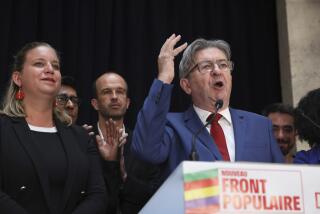Iranâs moderates make gains in runoff but fail to clinch a parliamentary majority
Reporting from Tehran â Iranian moderates and reformists who support last yearâs landmark nuclear deal have won the largest number of seats in parliament following runoff elections, marking a shift away from hard-liners and boosting moderate President Hassan Rouhani as he looks to secure a second term in office.
The results released Saturday on state television failed to give the moderate-reformist camp an outright majority in the 290-seat chamber, however. They will now probably try to attract support from dozens of independent lawmakers whose political leanings vary depending on the issue at hand.
There were 68 seats being contested in runoff elections held Friday in 55 constituencies around the country. Residents in the capital, Tehran, did not take part in the second-round balloting because moderates won all 30 seats there outright in Februaryâs first round of voting.
The reformist and moderate list claimed 37 seats in Fridayâs vote, giving them a total of 143 seats in the assembly â just two seats shy of 50%. They were followed by hard-liners, with 86 seats, and independents, with 61. Twenty-two hard-liners and nine independents won seats in the runoff.
Mohammad Reza Aref, head of the moderate-reformist bloc, welcomed the victory, saying, âOur priority is engagement with other factions rather than confrontation,â the semiofficial ISNA news agency reported.
Tehran-based political analyst Saeed Leilaz called the results a âdecisive victoryâ for the moderate-reformist bloc.
âIt is now clear that they are more popular than hard-liners, even in the remote areas,â where their support was seen as lower than in major cities, Leilaz said.
See more of our top stories on Facebook >>
A total of 17 women won seats in both rounds of elections, the largest number ever. At least 11 of them are from the moderate-reformist camp.
Deputy Interior Minister Hossein Ali Amiri told state TV that turnout in the runoff elections was 59%, compared with 62% in the February elections. About 17 million Iranians were eligible to vote.
Iran does not allow international election observers to monitor its polls, which are organized by the Interior Ministry.
Fridayâs vote was marred by violence in the town of Mamasani, where four people were wounded in a shooting that followed an argument between supporters of rival candidates there.
Last yearâs nuclear deal between Iran and world powers called for curbs designed to prevent Iran from pursuing nuclear weapons in exchange for the easing of painful economic sanctions. Although nuclear-related sanctions have been lifted, other international sanctions remain in place, and the dealâs promised economic benefits are only starting to be felt.
NEWSLETTER: Get the dayâs top headlines from Times Editor Davan Maharaj >>
Rouhani could enjoy a boost in popularity heading into next yearâs presidential elections if the new parliament is seen as delivering on his priorities.
ALSO
Despite Syrian truce, Aleppo residents live in âstate of terrorâ
Airstrike on Aleppo hospital kills last pediatrician in Syriaâs largest city
Why the worldâs biggest exporter of crude is trying to wean itself off oil
More to Read
Sign up for Essential California
The most important California stories and recommendations in your inbox every morning.
You may occasionally receive promotional content from the Los Angeles Times.










